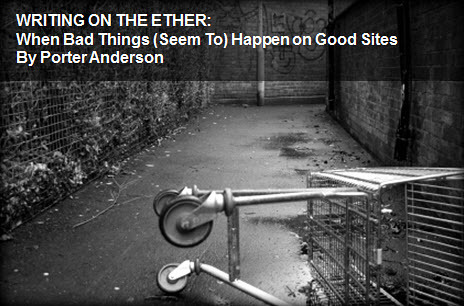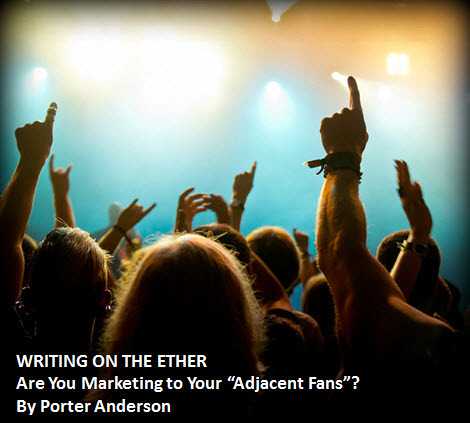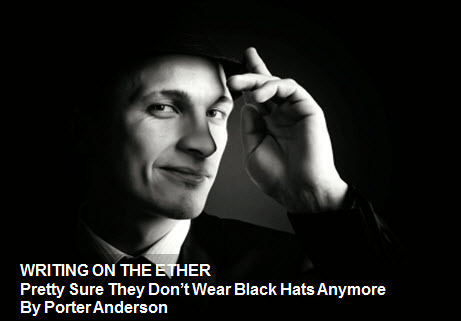Jane Friedman's Blog: Jane Friedman, page 173
August 22, 2013
WRITING ON THE ETHER: When Bad Things (Seem To) Happen on Good Sites
Table of Contents
Goodreads: “We take all these comments very seriously”
“I despise all of this drama”
It’s Just Books
Goodreads: “We take all these comments very seriously”
You don’t necessarily think the world of bookworms would be full of bullies.
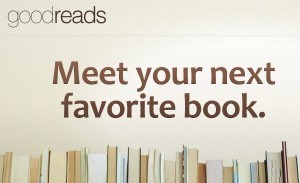 Ether readers’ private notes to me about recent allegations of reader-on-author bullying at Goodreads have been intelligently restrained—concerned, not accusatory; baffled, not indignant. Communicating in direct message on Twitter and in email with me, readers have asked about this issue in terms of searching, thoughtful worry.
Ether readers’ private notes to me about recent allegations of reader-on-author bullying at Goodreads have been intelligently restrained—concerned, not accusatory; baffled, not indignant. Communicating in direct message on Twitter and in email with me, readers have asked about this issue in terms of searching, thoughtful worry.
So I’m especially glad to have new reassurance from Otis Chandler‘s managerial team at the Goodreads offices in San Francisco to offer you, and on a very tight deadline. I’m placing this statement first, hoping you’ll bear it in mind as we look at some details of recent remarks.
From Goodreads, then:
We take all these comments very seriously and would like to make it clear that threatening violence against other Goodreads members is not tolerated on the site, and any such content will be removed promptly when brought to our attention.
If any of your readers have any concerns, please encourage them to bring it to our attention at support@goodreads.com and we’ll investigate and take the appropriate action.
As a point of process, I might add that if you need to register a concern at that email address, put something direct in the subject line (along the lines of “Possible Abuse,” etc.), so the support staff can quickly identify your correspondence as sensitive.
 Now. A single ground rule as we look at what’s afoot: No one is objective (as journalists learn very quickly about themselves), but we can all try to be fair. And sometimes this means the best we can do is be very clear in acknowledging what we don’t actually know.
Now. A single ground rule as we look at what’s afoot: No one is objective (as journalists learn very quickly about themselves), but we can all try to be fair. And sometimes this means the best we can do is be very clear in acknowledging what we don’t actually know.
Hearsay can be intensely damaging. Confusion can be as big an enemy as mendacity. Having to say, “I just don’t know what happened, I wasn’t there,” can be less gratifying than adopting the claims of others as factual.

Mary Elizabeth Williams
The line I started with—”You don’t necessarily think the world of bookworms would be full of bullies”—is the lead on Mary Elizabeth Williams’ writeup at Salon, Did a writer get bullied on Goodreads?
In her piece, Williams summarizes her understanding of the assertions of a writer named Lauren Howard.
On her Tumblr site, Howard identifies herself as being 22 and English. She says she had intended to launch a book titled Learning to Love, and now has decided not to publish because of bad experiences on Goodreads.

Lauren Howard
Briefly, Howard writes of asking (in a forum) a procedural question as a Goodreads newcomer. She wanted to know how she was attracting ratings of her book before it was published.
As it turns out, these are ratings of interest (not of review) that Goodreads members can make, based on a forthcoming book’s description.
Howard writes:
I was then attacked by people for asking that question. People started to rate 1-star to prove “we can rate whatever the hell we want.” My book was added to shelves named ‘author should be sodomized’ and ‘should be raped in prison’ and other violent offensive things, all for asking a simple question as a newcomer to the website.
Williams at Salon adds that “those earlier comments on Goodreads have now been deleted, so it’s impossible to gauge their severity, or how a young, debut author with a self-published book may have viewed them. ”
I’ve got A-Rod Fatigue.
— James Scott Bell (@jamesscottbell) August 20, 2013
What we can see, though, is reaction to Howard’s descriptions of her experience. Here is one, for example, from an Ether reader to me in email:
This little incident was the first time I’ve seen these horrific threats first-hand, but I know it’s an iceberg tip. I hear heartbreaking tales of this kind of abuse on a regular basis, and it seems to be escalating.
And this from another Ether reader, this time on Twitter:
There are packs of people (authors/reviewers alike) that are out of control on the site.

Tina Klinesmith
And here’s a blogger’s response to the matter. In Bullies on Goodreads? What’s next?, author Tina Klinesmith writes:
A smear campaign began simply from [Lauren Howard's] question as several people began giving her book 1-star ratings and adding it to “shelves” that threatened body harm and harassment to the new author. When she contacted Goodreads about the issue, she was informed that this was allowed and fell under the “freedom of speech” umbrella.
For all our praise of community—and despite Goodreads’ foundation on that very concept—what you’re seeing is community members, with all good intentions, handling things that are known only through partially observed and emotionally described assumptions as if they were fully visible to us. As you’ll see in our next section, Lauren Howard already is writing about the situation being “so blown out of proportion.” Back to Table of Contents
Conclusion from @dekaminski read it#theconf pic.twitter.com/mNxYmaNBoS — Brit Stakston (@britstakston) August 21, 2013
“I despise all of this drama”
The climb-down is a peculiarly familiar move in our culture today, and hardly just in publishing. One frequent feature of it is that it’s rarely announced as such by a person performing it. Embarrassment, lingering confusion, pride—these and more quite understandable components might be in play. In a new Tumblr post headlined Hopefully clearing stuff up…, Lauren Howard later has written:
Never did I expect (or plan!) for this to be so blown out of proportion…I cannot stress enough that though some people didn’t, I personally, originally perceived shelves as threats…When you are feeling targeted and victimized and a whole lot paranoid, it’s easy to feel like you’re being threatened.
As you may know, Goodreads members can name their virtual book “shelves.” Some members seem to enjoy naming them with colorful language that might be described as ribald genre designations. Howard:
As a friend of mine pointed out, no one could physically hurt me. I was not afraid of that at any point. I DO NOT condone these articles making it out like I was afraid people were going to turn up at my house and rape me for God’s sake. I was afraid because of the exposure I was getting and the negativity following.
If I had created a shelf at Goodreads called “Shirtless Men Kissing Beautiful Women”—my own overworked line for romance novels of a certain cover trend—might that line be interpreted by someone else as threatening or abusive? Perhaps. Eye of the beholder.
Because the world’s been waiting for a book of Drew Barrymore’s ‘heart shaped photographs…” — Don Linn (@DonLinn) August 22, 2013
And can we doubt that something Howard experienced as really unpleasant occurred? Probably not, and I’m sure we all wish her well. I think it’s reasonable to accept her explanation of being very upset by what she had perceived as hostility. I’ve seen enough messages relative to the event to know that she did, at the very least, run into a snarky, impatient tone in some instances and I fear there’s a good likelihood that she was treated to worse. Embedded in some of Howard’s new comments, you’ll also find that while she originally wrote that Goodreads had turned a deaf ear to her distress, the company has, in fact, been in touch with her. The emphasis here is mine as I quote her:
I was asking myself: “How can people get away with abusing authors this way? There is a line between free speech and hate!” Goodreads has now told me this is NOT the case. Abusive shelves and ratings based on the author are NOT permitted.
@Issendai This whole damn thing is one huge misunderstanding. No one is informed. It started on a misunderstanding and no one is learning. — Lauren (@laurenpippa) August 21, 2013
She now clarifies:
At no point have I ever said “People threatened to rape me”… simply expressed how disgusted I was…
Still, one reason this situation could gain the attention it did is that the idea of a culture of bullying somewhere in the massive membership of Goodreads is not new. About a year ago, the Huffington Post’s Books unit found itself in hot water with some readers for running Why It’s Time To Stop The Goodreads Bullies, an unsigned opinion piece representing an effort called “Stop the GR Bullies.” The goal there was said to be to deflect such harsh treatment of authors as Lauren Howard describes experiencing.

Andrew Losowsky
Before the Stop the GR Bullies piece had been out long, the Post’s books editor, Andrew Losowsky, found himself posting a piece of his own, Stop The GR Bullies: An Explanation, about “what I think we got wrong.” Losowsky had found that there were critics of the critics—commentators who had qualms about the anti-bullying group, itself. He wrote:
Many members of our community, including several whose opinions and thoughts we highly respect, were upset that we had given a platform to the creators of the [Stop the GR Bullies] site and, in so doing, appeared to endorse their behavior. To those who feel that we let them down, I can only apologize. We should have provided more context and presented the debate over the site — and the broader issue of online bullying in the books world — in a more balanced fashion.
That “more balanced fashion” is rarely fashionable, it seems. I like Lowsowsky, and I don’t think for a minute that he “got wrong” deliberately on this. It’s hard for a lot of us to remember that “more balanced fashion” when we get around large, corporate entities that have a presence in publishing. We demand a perfection of these complex, evolving entities that we’d never expect of ourselves. Back to Table of Contents

From VQR – More on poet Tom C. Hunley
It’s Just Books
I’m in no better position than anyone else to tell you what actually was said to, or about, Lauren Howard or any other author or reader on Goodreads.
I seem to be a lot less interested than many people in “all of this drama.” And some of this is just personal preference: I don’t like gossip, I have never cared for hearsay, and I’ve always found speculation to be a waste of time. This is why I’m so tired of our industry’s pundits and their predictions. I don’t care what they predict: I care what happens.
Needless to say, and as has been demonstrated in the Howard instance of alleged mistreatment, others feel differently. What’s more, the potential for abuse in a system as large and as diverse as Goodreads is as acute, yes, as it is “IRL,” in real life.
I know–bike shorts are NOT attractive. But I’m not sure you want everyone in cars behind you to see THAT much of your underwear, right? — Ginger Clark (@Ginger_Clark) August 21, 2013
My own interaction with the Goodreads leadership—and this has included face-to-face meetings and conversations—has led me to believe that the intentions there are wholly good, the motivations earnest. Goodreads’ membership last month surpassed 20 million users. That’s close to the size of the population of Australia.
Take just a moment to imagine trying to create a way to manage and facilitate the interactions of that many people who, of course, are not even bound by national or other constructs; they’re brought together only by an interest in engaging in reading.

Otis Chandler
As of a February report to the Tools of Change conference in New York from Chandler, the Goodreads members were sharing 19 million books per month on Facebook alone. You can read more and see a video interview with Chandler from our colleague at O’Reilly Media Jenn Webb in Goodreads’ evolution from discovery platform to reader community. I’ll embed the slides from Chandler’s presentation for you here, too, in case you’d like to look at some of what was learned from a survey he had conducted of a sizable subset of the Goodreads population.
What’s Going On With Readers Today from Goodreads
I’m told by members of the Goodreads staff recently that this Amazon-owned system produces tens of thousands of reviews and/or ratings of books every day and that only a tiny fraction of those may be flagged as problematic in one way or another—frequently the complaint, it seems, is that a review contains a spoiler.
Despite glitches along the way, in January alone of this year, Chandler has reported, there were more than 1.15 million quotes from books shared among members. In short, this is easily the biggest effort of its kind in history.
Put another way, we have never seen a population of this magnitude brought together for this purpose.
Put still another way, if there is a learning curve for a 22-year-old would-be published author in such a setting, there is also a learning curve for the company, itself.
Review pitch I just received: “Critics have called [author] ‘egotistical,’ ‘sexist’ and ‘narcissistic.’ Yeah, I think I’ll pass, but thanks.
— Emily St. J. Mandel (@EmilyMandel) August 19, 2013
We look at a corporate entity growing at a spectacular rate and we expect its procedures and technologies to function perfectly. How realistic is that? Can you say to yourself that the 22-year-old author deserves some slack for finding her encounter with such a major undertaking to be at some points intimidating, frightening, confusing? Of course you can. Can you worry that there may, indeed, be some members of this vast international population who will take advantage of a newcomer’s confusion and behave in abusive ways? Of course you can, and you can do it without for a moment condoning such behavior. Bullying in any form is practiced by thugs. Where it exists, it needs to be stopped. Goodreads has the capability to delete members found to be transgressing its standards of interaction. I have no doubt that its administration takes that action when an investigation proves it to be appropriate. And can you understand that in an age when the digital dynamic has upended old patterns of book discovery, we need Goodreads to succeed in stimulating readership, not fail? I’m betting you can. I’m also betting that the 20 million people who are participating in Goodreads offerings today aren’t doing it because they’re enjoying being bullied at the site. I think most of them are having what they consider a positive experience. Or they wouldn’t be there, would they?
One tip on submitting your novel to agents- don’t send between mid September and Mid October as that is Frankfurt book fair season. — Jonny Geller (@JonnyGeller) August 19, 2013
The kind of hand-wringing intensity that has accompanied the Howard allegations and debates in recent days are a form of tacitly condoned bullying, in themselves. We are all bullied by hyperbole, rants, unstated bias, and ill-informed accusation. And I, for one, am tired of seeing the industry! the industry! riled up and shoved around in one direction and another by people who thrive on crisis, who get their kicks upsetting everyone else.
Alarmists are bullies.
The next time you start hearing of someone who’s been badly treated in one part of the publishing world or another, the first thing, if you’re close to the issue, is to make sure the perceived victim is supported and protected, certainly. It’s not the person on the receiving end of what looks like an attack from whom we expect a cool head under fire (and that includes Howard in this case). It’s from ourselves we need to demand careful reaction.
Try recommending facts over quick “grapevine” reactions to your followers. Argue for patience; alert restraint. Think twice before you “spread the word” on something you can’t see clearly. Once an incident is identified and the aggrieved party has been put into touch with the correct administrators, wait and watch a little while. Partial information can be damaging to good people and good companies, too.
When you feel the pressure to jump up and run around the room shouting with everyone else, try remembering that it’s just books we’re talking about here. Not life and not death. Books. They’re very important to us, yes. But are they worth hurting each other and important institutions? Just books. Take a breath, say it with me: just books.
I have to admit; there is something quaintly calming about the lack of algorithm to our Twitter timelines — posts appear as they appear.
Breaking news: being a total asshole to Mother Nature has horrible and long lasting consequences. http://t.co/jagTWI7yLM
— Craig Mod (@craigmod) August 21, 2013
Main image: iStockphoto – StephenHenry4
The post WRITING ON THE ETHER: When Bad Things (Seem To) Happen on Good Sites appeared first on Jane Friedman and was written by Porter Anderson.
August 20, 2013
Chronic Back Pain and The Writing Life: A Few Remedies

Cincinnati Mini-Heart Marathon, 2002
Like most writers, I spend a great deal of time sitting in front of a computer. Every job I’ve held post-college has been a desk job, and my non-work looks exactly like my “real” work—seated, with a laptop.
While I managed to stay active in my twenties as a runner, as time passed, I let other things take priority over exercise. During the last 18 months, I’ve been paying the price with a case of chronic low-back pain. It’s especially frustrating because it prevents me from returning to the exercise I enjoy most: running.
In the hopes of helping other people who may also be suffering, I’d like to share a few remedies I’ve discovered.
1. The DonTigny Method
For any women who suffer from low-back pain, I especially recommend this method. Physical therapist Richard DonTigny offers a program of simple corrections and stretches that focus on the sacroiliac joint, which he believes is at the root of many cases of lower back pain.
I’ve always noticed—especially when I actively ran—that any problems I experienced usually started in my hips. DonTigny’s method helps restore stability and strength to the hips, pelvis, and lower back. It’s helped me immensely.
2. The Egoscue Method
Before discovering DonTigny, I found this post by The Modern Health Monk, 4 (Rarely Used) Things You Can Do Right Now for Immediate Lower Back Pain Relief.
He describes a range of passive stretches called The Egoscue Method, and offers other helpful tips. I won’t rehash it here; you can find it all described in his post, with photos.
After reading the Monk, I bought The Egoscue Method, and have used one particular stretch repeatedly throughout the day—The Counter Stretch. (You can find a good photo & description at this site; visit #9, the very last one on the page.)
I also bought the book on The Gokhale Method, but with both Gokhale & Egoscue, I find it difficult to apply them methodically and comprehensively without having someone monitor my movements and posture, and advise me when I’m off track or engaging in “bad” form.
3. Treadmill Desk
This is a preventative measure rather than a remedy. Sitting for about 8-10 hours per day for 20 years has likely resulted in my current troubles, not to mention it causes a range of health problems I’d like to avoid over the long term. (Read Susan Orlean in The New Yorker to learn about the dangers of sitting.)
So I now work at a treadmill desk at the VQR offices. The desk is a VertDesk; it can be adjusted to any height with the push of a button. Below I use a treadmill base from Lifespan. The two work together beautifully. You can see me in action below.
[If you can't see the video above, click here. Thanks to Allison Wright for acting as cinematographer.]
However, I must emphasize: nothing about standing at my desk, or walking at my desk, has cured my low-back pain. This is a long-term health decision that I hope will prevent further problems from occurring. I’m not completely back to normal yet, but I hope with enough time and changes to my lifestyle, I can be. It would be nice to call myself a runner again.
What methods work for you? Share in the comments.
The post Chronic Back Pain and The Writing Life: A Few Remedies appeared first on Jane Friedman and was written by Jane Friedman.
August 15, 2013
WRITING ON THE ETHER: Are You Marketing to Your “Adjacent Fans”?
Table of Contents
Looking for the “Comp”-etitive Edge
Marketing: Not Just for Companies Anymore
Wait. Who Wrote That?
Looking for the “Comp”-etitive Edge
Books are books but they are also containers of ideas, worlds, beliefs, philosophies, attitudes, world-views, etc.
So far, so good, right?
Even though I’ve hit you with the m-word here—oh, no, marketing!—we’re OK with the idea that books contain ideas. The several books I’ve read that seemed not to have a single idea to offer, I’ll kindly not name here. And to their authors: You owe me.

Peter McCarthy
But seriously, pay attention to this good concept that book-marketing veteran Peter McCarthy is onto here. He’s a former Vice-President of Marketing Innovation for Random House and a former Vice-President of Penguin.
What McCarthy has to say in Marketing: Finding and Selling to Non-Book Book Audiences at Digital Book World has special application for those who rightly follow the business carefully, especially entrepreneurial authors.
There’s a built-in trap here, as many of us know. So easy to fall into. I saw it open up recently under the feet of a colleague whose book isn’t moving well. Fiction, very well-written. Her efforts to sell it so far have been mainly within the publishing industry. It’s not about publishing at all, but her access and immediate, articulate, daily interface with the publishing world has led her to focus her sales efforts so far right here in her own backyard.
 As we discussed, she needs to platform-out to readers, not platform-in to the industry! the industry!
As we discussed, she needs to platform-out to readers, not platform-in to the industry! the industry!
If you’re selling one of the many (many) how-to writing books—”the other www,” in which writers tell other writers how to write—then yes, the writers corps is your sales target. Otherwise, you likely need to platform-out.
It’s perfectly predictable and understandable, too, when Porter and everybody else keeps yelling at you to be a smart publishing-business professional: you can easily focus on the business, sharing your career development with your peers to such a degree that you find yourself out of touch with the “real” readers you once had so well in mind.
The challenge is to figure out how to market to the right space, to a part of the world-at-large that might want to read what you’re on about in your book(s).
I love the language in A THOUSAND AND ONE NIGHTS: “He was of ill aspect and evil star.” I know guys like that.
— Emily St. J. Mandel (@EmilyMandel) August 14, 2013
Back to McCarthy. He’s talking about a publishing sales conference years ago:
I’m flashing back with great clarity on a phrase I heard repeatedly. Really, really repeatedly. That phrase was: “…will appeal to fans of…” As in “…will appeal to fans of John Grisham…” or …will appeal to fans of Nora Roberts…” or “…will appeal to fans of Malcolm Gladwell…” and so on. These phrases uttered by editors, marketers, and salespersons were based on the “comps” – the titles deemed comparable to this new publication we were spending thousands of person-hours considering.
With gratifying candor, McCarthy tells us the actual validity of these “comps” frequently was dodgy:
Many of the insinuations of comparability would have been more honestly phrased as “…will appeal to 2% of fans of John Grisham if we’re lucky…” but hope springs eternal…
Lasted just 4 months. MT @drmabuse San Francisco Chronicle abandons paywall, returns to free content. http://t.co/hunOMJXMLW — Sarah Weinman (@sarahw) August 14, 2013
As bad as this approach could be, McCarthy confesses to one weakness:
There was one type of comp I loved then and love even more now; the non-book comp. As in “…will appeal to fans of Star Wars…” or “…will appeal to fans of The Sopranos” or “…Six Feet Under…” or “….The Walking Dead…” or “…Post Punk Bands…” or “…the Tea Party…” or…you get it.
That’s what I want you to think about. The non-book comp. Here’s McCarthy on the rationale:
Fervent crowds which are very large, consist of readers (check Pew – most Americans read) and can be sliced and diced to target within the group without losing the key aspect of this comp’ing: the ability to hop on an existing wave that is far larger than the book could ever make on its own.
Blah, blah, blah, blah, unsupported conclusion, blah, blah, blah… — Don Linn (@DonLinn) August 14, 2013
At times when a non-book-comping effort may have failed, McCarthy writes (emphasis mine):
“The reason for this was our inability to identify, reach, and engage those “adjacent” fans efficiently. We would have needed to buy a lot of media in a lot places – competing against other companies doing to the same thing who had far deeper pockets than us – to reach them all, or enough of them to either (a) make a difference or (b) know that it was actually a bad comp!”
“Adjacent fans.” Adjacent fans! My new favorite phrase.
Intriguing, isn’t it? You get immediately what those fans are, don’t you? We’re talking about readers whose tastes lie next door to some of your book’s interests.
McCarthy uses television properties as non-book comps:
With a real non-book comp in hand, creativity can be unleashed. How to reach super fans? How about casual viewers? Is there a trend of [online] searches beginning at the opening of a [TV series] season? The close? Do consumers want or need other media to fill the gaps between episodes or seasons? What do they look to? When do the seasons hit Netflix? Amazon instant? Both? One or the other? Audiences, audiences. Times to market. Messaging, creative. The opportunities open up based on a little comp research.
Those books that “are also containers of ideas” can “‘comp’ to life” (McCarthy’s deft turn of the phrase) when given this kind of attention.
So, no, yeah, when I spoke with my friend about her slow-seller, we found ourselves mentioning several films to each other, each of which had some “comp”-arable material to her novel. Those are non-book comps. And suddenly she has film fans to think about in terms of who might be buyers of her book.
Now, stay with me. I’d like to set this non-book-comp business into a more comp-rehensive look at a trend taking shape: entrepreneurial authors, yea, self-publishers, are running closer to their corporate cousins in traditional than they may think.
@RebeccaSchinsky @glecharles @Porter_Anderson Guilty as charged: http://t.co/MdHUeDPkAx — Liberty (@MissLiberty) August 14, 2013
Marketing: Not Just for Companies Anymore
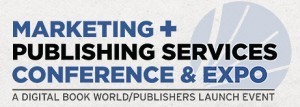 McCarthy in his good piece for DBW is writing as one of the main programming people for the highly promising new conference event, Marketing + Publishing Services Conference & Expo (hashtag: #DBWMP) It’s set for September 26 in New York City and you may have seen me tweeting about it.
McCarthy in his good piece for DBW is writing as one of the main programming people for the highly promising new conference event, Marketing + Publishing Services Conference & Expo (hashtag: #DBWMP) It’s set for September 26 in New York City and you may have seen me tweeting about it.
 A follow-up to F+W Media’s excellent Discoverability Conference of last fall—about which I wrote here at DBW and here on the Ether—this new 2013 conference is a co-production of DBW and of the Publishers Launch series produced by Mike Shatzkin and Michael Cader.
A follow-up to F+W Media’s excellent Discoverability Conference of last fall—about which I wrote here at DBW and here on the Ether—this new 2013 conference is a co-production of DBW and of the Publishers Launch series produced by Mike Shatzkin and Michael Cader.
I’m glad to be working with F+W on its conferences and I can offer readers of the Ether a 25-percent saving on registration for the Marketing + Publishing Services Confab with the use of the discount code PORTER at registration. I’m looking forward to covering this one; its roster of speakers has been growing more impressive all summer.
Now, Shatzkin recently wrote a helpful article on McCarthy’s work. In 7 starter principles for digital book marketing learned from Peter McCarthy, Shatzkin observes:
Pete’s really invented something in publishing by looking for comparable products that aren’t other books, but outside publishing they know all about seeking comps that aren’t precisely the same as their own product. The techniques Pete employs to find audiences in people that are like the known audiences for a book are standard tools in consumer marketing outside publishing.
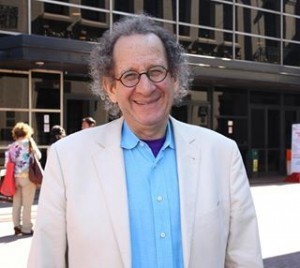
Mike Shatzkin
As Shatzkin goes on to enumerate some of those starter principles McCarthy uses, you can readily spot things entrepreneurial authors know well. For example:
The digital marketing menu contains nearly an infinite number of items. That results in a tremendous amount of wasted effort spent trying things that a little research would have indicated will never work.
McCarthy confirmed to me in a tweet exchange a few days ago, that the realistic approach is something like an “agile” effort in publishing. You iterate and re-iterate marketing components, changing tack according to what’s working. And yes, there can be some waste in there as various things are tried and put aside if not producing, especially if research doesn’t precede the trial (and the error): budgeting for marketing, as Shatzkin discusses, may not mean what it once did.
Well, this isn’t that far from what authors experience in adjusting their online book pricing, is it? You see them:
Bobbing and weaving as price points seem to work well, then fade among the algorithms almighty;
Trying their best to learn which guest blog posts might really benefit them (“is that blog’s readership a near-comp for my target crowd?”);
Reading entrails to guess when a giveaway is right and when it will produce no returns, just greedy takeaway-ers.
This morning, my job could be described as “Ginger Clark and the case of the confusing check from a corporation known for disorganization.”
— Ginger Clark (@Ginger_Clark) August 15, 2013
And how about the point we make so frequently with writers that there’s no such thing as being out-of-print in the digital era? Shatzkin on McCarthy’s point No. 6;
The whole concept of “time” also needs to be rethought…not just how long programs run but also when they take place in relation to the lifecycle of the book. In the digital era, whether books are well-represented in stores at any moment is not necessarily the key determinant of how well they’ll sell, so pushing a backlist book that might be thinly distributed but which is suddenly timely is perfectly sensible…And it wasn’t that way five or ten years ago when marketing efforts wouldn’t be extended if books weren’t in the stores.
These are good points, Shatzkin’s piece makes them well, and McCarthy’s guidance rings true. And? And this is heartening in another way. While much of the conference-event structure for entrepreneurial authors and corporate-publishing people remains separate, look how the topics of salesmanship are converging.
The Discovery Myth (with tweets): http://t.co/aSYYqd0vId cc: @Porter_Anderson @peterturner @arhomberg
— Guy L. Gonzalez (@glecharles) August 15, 2013
No regular readers of the Ether are having any trouble following the issues we’re flagging here. McCarthy and Shatzkin are working on an event created primarily for publishing-industry folks, but their talking points are things entrepreneurial authors are tracking right along with them, and very close to the ground, too, no layers of corporate departments underneath.
Shatzkin:
Understanding the book and author’s digital connections and the right language to describe the book you’re selling are “foundational” elements; everything flows from them.
For authors?
 After Marketing + Publishing Services, I’ll be in Los Angeles for F+W Media’s next event: Writer’s Digest West (hashtag: #WDCW13)—for authors, not the corporati—opens on September 27 with a full day’s conference-within-a-conference on self-publishing. I’m moderating a panel there—“Congratulations! You Published It — Now, How Do You Sell It?”—with Amazon’s Jon Fine; Bookigee’s and WriterCube’s Kristen McLean; and author-filmmaker Eric DelaBarre. I’m also teaching my own Boot Camp again on Public Speaking for Writers, and covering the full conference. On that one, too, you can save 25 percent with code PORTER, and I’d be so glad to see you there.
After Marketing + Publishing Services, I’ll be in Los Angeles for F+W Media’s next event: Writer’s Digest West (hashtag: #WDCW13)—for authors, not the corporati—opens on September 27 with a full day’s conference-within-a-conference on self-publishing. I’m moderating a panel there—“Congratulations! You Published It — Now, How Do You Sell It?”—with Amazon’s Jon Fine; Bookigee’s and WriterCube’s Kristen McLean; and author-filmmaker Eric DelaBarre. I’m also teaching my own Boot Camp again on Public Speaking for Writers, and covering the full conference. On that one, too, you can save 25 percent with code PORTER, and I’d be so glad to see you there.
 There’s even a simultaneous event in LA, Screenwriters World (hashtag: #SWCW13), specifically for the film folks. (And even there, the discount code will work; go for it.)
There’s even a simultaneous event in LA, Screenwriters World (hashtag: #SWCW13), specifically for the film folks. (And even there, the discount code will work; go for it.)
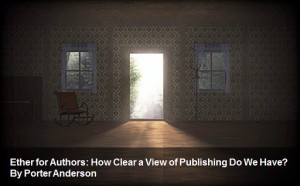 In Tuesday’s Ether for Authors: How Clear a View of Publishing Do We Have? at Publishing Perspectives, I wrote about how great it would be to see an authors’ edition of the Bowker Market Research team’s terrific 2013 U.S. Book Consumer Demographics & Buying Behaviors Annual Review.
In Tuesday’s Ether for Authors: How Clear a View of Publishing Do We Have? at Publishing Perspectives, I wrote about how great it would be to see an authors’ edition of the Bowker Market Research team’s terrific 2013 U.S. Book Consumer Demographics & Buying Behaviors Annual Review.
I’ll offer you one canny viewpoint from that survey of interest to many entrepreneurial authors. You know how we love to say, “Oh, that genre is really taking off now,” or “this genre is hot, hot, hot, it’s the new sci-fi,” etc.? But a lot of that appears to be in our anec-data-loving heads. A Hunger Games or Game of Thrones or Fifty Games in the Shade rolls over us and we think one genre or another now is leaping past the others, right? Maybe not so right.
Between 2009 and 2012 there have been only small shifts among both the major categories and subgenres. Over the four year period, the three percentage point change in spending by the adult fiction category, for example, was the biggest shift among major categories.
Romance? “Romance, Porter?” you ask, ready to hear tales of genre-vaulting Shirtless Men Kissing Beautiful Women.
In 2009, 2010, 2011, and 2012, uh, no. Bowker’s data tells us that romance held steady in market share. In units sold, 6 percent, all four years. In dollars sold, 3 percent, all four years. Seems to me that a lot of perfectly good shirts died for not a lot of progress, but my silly bias isn’t the point: what’s interesting here is that we can perceive big strides in areas of the industry that may not be borne out by the numbers.
 No disrespect here for those numbers, however: By comparison, fantasy sat still at 2 percent in dollars, all four years; its biggest “bump” was moving from 2 percent to 3 percent of units sold in 2011 and 2012.
No disrespect here for those numbers, however: By comparison, fantasy sat still at 2 percent in dollars, all four years; its biggest “bump” was moving from 2 percent to 3 percent of units sold in 2011 and 2012.
And to push on to our conclusion today, I’ve got another wish.
In addition to an author-focused and -priced version of Bowker’s enlightening work, I’d love to see marketing folks produce their best stuff with two “adjacent audiences” in mind: corporate publishing, sure, but also entrepreneurial authors. We probably could use full-day or half-day marketing conference events for entrepreneurial authors, not just for our corporate colleagues.
I want you to read the next passage without looking below to see who wrote it. I think you’ll find it makes the point well that folks from both major “sides” of the industry are beginning to talk like “adjacent fans” of each other, when it comes to marketing books.
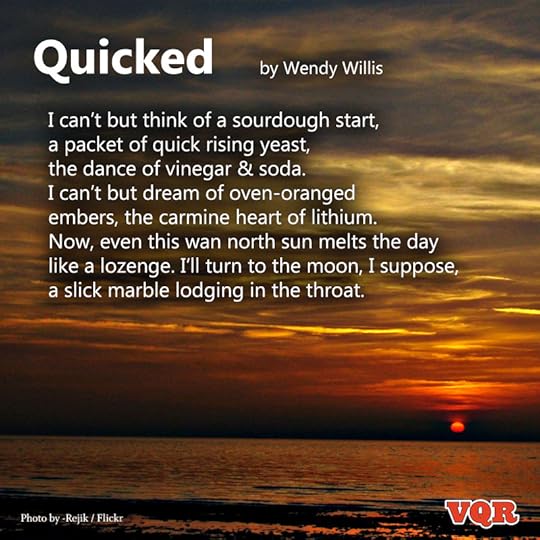
From VQR: More on poet Wendy Willis
Wait. Who Wrote That?
OK, now don’t look below, no cheating. Just read this first:
As the number of books grows that have commercial appeal but which are published so far outside the conventional trade that their sales aren’t even captured in industry data, it further weakens the legacy publishing ecosystem and further encourages both established and aspiring authors to work around it.
Aspiring authors every week see books on the NY Times Bestseller List that are either self-published or have imprint names they’ve never heard of.
When conventional publishing requires an agent to get a deal (which it does, and which takes time), then you have to wait for publishers to make a buy-or-not decision (more time), and then put your book out on a trade publishing schedule that usually wants to give Barnes & Noble and other retailers months of advance notice (still more time), it can seem ever-so-much-more appealing to just skip the wait and go straight to self-publishing, which will put books on sale right now (more or less).
I’ll even toss in one more short bit, to see if I can throw you off on who’s writing:
The single biggest reason (aside from a fat advance payment, which few get) for authors to work through a publisher is to get the distribution of printed copies to many stores.
 Barry Eisler! You’re sure of it, right?
Barry Eisler! You’re sure of it, right?
I would be, too.
Remember when he said that the main advantage to authors of legacy publishers was their distribution capability? It was in his keynote address at the Pikes Peak conference and his comments were attacked by literary agents on the spot? I wrote about it here, in Ether for Authors: The Establishment Strikes Back and in Writing on the Ether: Agents and Authors at the Coalface.
But guess what. This isn’t Eisler.
No, it’s our good friend Shatzkin again. Those quotes I just gave you are from a brand-new esssay, more recent than his article on McCarthy.
 In Losing bookstores is a much bigger problem for publishers than it is for readers, Shatzkin is working this time toward Publishers Launch Frankfurt on October 8—which runs parallel to the Frankfurt Academy’s CONTEC Conference (hashtag #CONTEC) in which I’ll be moderating. (More on that one soon.)
In Losing bookstores is a much bigger problem for publishers than it is for readers, Shatzkin is working this time toward Publishers Launch Frankfurt on October 8—which runs parallel to the Frankfurt Academy’s CONTEC Conference (hashtag #CONTEC) in which I’ll be moderating. (More on that one soon.)
 Too many times I’ve heard people say that Shatzkin, a longtime consultant to elements of the traditional-publishing establishment, was “old guard” and “old school.” What I get in his writings, like those of McCarthy, is increasingly applicable to the challenges facing entrepreneurial authors, not just to publishing companies. What I like seeing Shatzkin do is play these challenges back to the client base in Manhattan in ways that make the world’s workforce of ever-more-sophisticated authors take on new clarity and position.
Too many times I’ve heard people say that Shatzkin, a longtime consultant to elements of the traditional-publishing establishment, was “old guard” and “old school.” What I get in his writings, like those of McCarthy, is increasingly applicable to the challenges facing entrepreneurial authors, not just to publishing companies. What I like seeing Shatzkin do is play these challenges back to the client base in Manhattan in ways that make the world’s workforce of ever-more-sophisticated authors take on new clarity and position.
As bookstores become less powerful discovery engines (fewer of them farther apart and fewer books on display in those that are left), people are forced to find out about books some other way. Many of those other ways are already online (without even counting the suggestions of online retailers). A lot of “word-of-mouth” these days is digital communication (email, Facebook, Twitter, or even a blog).
And as those traditional publishers find their own fortunes challenged by the same hurdles facing entrepreneurial authors, the science of identifying and wooing McCarthy’s “adjacent fans” will become more critical to both.
When an author is tired of checking his/her Amazon rating, he/she is tired of life.
— Jonny Geller (@JonnyGeller) August 13, 2013
Of all things, the difficulties of reaching readers in a content-choked market may be the most unifying element the industry has seen in a decade of digital disruption.
The entrepreneurial author, maybe in business for five years so far, needs his book “discovered” by a reader, right? Well, shake hands with the decades-old publishing house with two logos smacked on its merged forehead: same challenge.
Which is why we read Shatzkin writing this to publishers:
If you do straight narrative reading, your books may continue to sell in equivalent or even better numbers [as ebooks] than they did previously, but both your authors and your retailers will be looking hard at what you take and wondering if they can go around you. Your challenge will be to continue adding enough value to be worth enough of a share to have a business.
What do you think? Can you see more ways in which entrepreneurial authors’ marketing challenges are closer to those of traditional publishing than might have been expected? And how about “adjacent fans?” Any experience in marketing books to them?
Umbrella texting. Why sell this as an umbrella and not just a grip you add to any umbrella? http://t.co/pZNm1jvbX5
— Craig Mod (@craigmod) August 14, 2013
Main image: iStockphoto – DWPhotos
The post WRITING ON THE ETHER: Are You Marketing to Your “Adjacent Fans”? appeared first on Jane Friedman and was written by Porter Anderson.
August 12, 2013
The Collapse of a Writing Routine—and How It Was Restored

The workspace of Frances Kazan
T oday’s guest post is by Frances Kazan, the widow of famed director Elia Kazan.
For years I was a disciplined writer. After walking the dog, I was seated at my desk by 9 a.m. After 500 words I’d go downstairs for lunch, followed closely by the dog. Sometimes my husband joined us, and sometimes he didn’t. Like me, he was a writer; his office was on the floor above mine. Around 2 p.m. I would return to edit, then I took off for either a yoga class or a walk in the park. Following this routine, I finished a master’s thesis (later published), a historical novel, Halide’s Gift, numerous articles for Cornucopia magazine, several lectures, and the first draft of another novel, The Dervish.
I used to work in the writers room at the local library. When that became too crowded, I put a desk in the corner of our bedroom, not a satisfactory arrangement. For a while I returned to the library of the university where I earned my degree, as an older (wiser) student, but the commute consumed precious time. Then my son graduated, his bedroom became my office, its windows overlooking the gardens at the back of the house. I used to gaze out at the plane trees and ivy-covered walls through a line of Grateful Dead stickers.
I was blessed. I had my own private space, where the silence was broken only by the thud of my husband’s typewriter, and the dog snoring on the sofa. I loved being alone with my thoughts and my work, absorbed by the flow of writing, oblivious to the passage of time.
Time and change are unavoidable; gradually my husband’s health declined. The two of us continued to work during that last hot summer, then, three weeks after his birthday, he died. In defiance of this truth I kept writing, clinging to my routine to maintain the appearance of normality, but the silence overhead became a crashing noise.
Dealing with the practicalities was overwhelming. First the execution of the will, then going though his papers stored in a room full of filing cabinets. Our house, too big for one person, had to be sold. The task of making it “market ready” consumed me. Eventually I moved out of our home of 20 years, taking the dog and my husband’s cat, forcibly pried from his study.
My writing routine collapsed. The manuscript of The Dervish languished in a drawer. Then 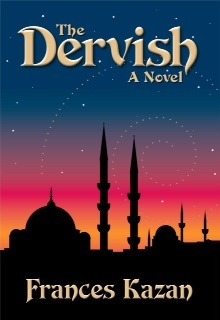 disaster: my dog was diagnosed with incurable blood cancer.
disaster: my dog was diagnosed with incurable blood cancer.
For several years I did not write another word. I traveled, found a new home, created a new life. One day generous friends loaned me their yali in Istanbul, where, in a room facing the Bosphorus, I returned to my manuscript. It wasn’t easy at first, thoughts were hard to organize, the right word was elusive. Eventually my routine was restored.
So here I sit at a new desk, in a new apartment, in another neighborhood, writing a blog to publicize the e-book edition. The Dervish has been published, a real book I can hold in my hand. Close by, my husband’s cat is asleep on the sofa, she’s frail, her gait is unsteady. I’ve lost track of her age.
The post The Collapse of a Writing Routine—and How It Was Restored appeared first on Jane Friedman and was written by Frances Kazan.
The Collapse of a Writing Routine—and How It Was Restored by Frances Kazan

The workspace of Frances Kazan
T oday’s guest post is by Frances Kazan, the widow of famed director Elia Kazan.
For years I was a disciplined writer. After walking the dog, I was seated at my desk by 9 a.m. After 500 words I’d go downstairs for lunch, followed closely by the dog. Sometimes my husband joined us, and sometimes he didn’t. Like me, he was a writer; his office was on the floor above mine. Around 2 p.m. I would return to edit, then I took off for either a yoga class or a walk in the park. Following this routine, I finished a master’s thesis (later published), a historical novel, Halide’s Gift, numerous articles for Cornucopia magazine, several lectures, and the first draft of another novel, The Dervish.
I used to work in the writers room at the local library. When that became too crowded, I put a desk in the corner of our bedroom, not a satisfactory arrangement. For a while I returned to the library of the university where I earned my degree, as an older (wiser) student, but the commute consumed precious time. Then my son graduated, his bedroom became my office, its windows overlooking the gardens at the back of the house. I used to gaze out at the plane trees and ivy-covered walls through a line of Grateful Dead stickers.
I was blessed. I had my own private space, where the silence was broken only by the thud of my husband’s typewriter, and the dog snoring on the sofa. I loved being alone with my thoughts and my work, absorbed by the flow of writing, oblivious to the passage of time.
Time and change are unavoidable; gradually my husband’s health declined. The two of us continued to work during that last hot summer, then, three weeks after his birthday, he died. In defiance of this truth I kept writing, clinging to my routine to maintain the appearance of normality, but the silence overhead became a crashing noise.
Dealing with the practicalities was overwhelming. First the execution of the will, then going though his papers stored in a room full of filing cabinets. Our house, too big for one person, had to be sold. The task of making it “market ready” consumed me. Eventually I moved out of our home of 20 years, taking the dog and my husband’s cat, forcibly pried from his study.
My writing routine collapsed. The manuscript of The Dervish languished in a drawer. Then  disaster: my dog was diagnosed with incurable blood cancer.
disaster: my dog was diagnosed with incurable blood cancer.
For several years I did not write another word. I traveled, found a new home, created a new life. One day generous friends loaned me their yali in Istanbul, where, in a room facing the Bosphorus, I returned to my manuscript. It wasn’t easy at first, thoughts were hard to organize, the right word was elusive. Eventually my routine was restored.
So here I sit at a new desk, in a new apartment, in another neighborhood, writing a blog to publicize the e-book edition. The Dervish has been published, a real book I can hold in my hand. Close by, my husband’s cat is asleep on the sofa, she’s frail, her gait is unsteady. I’ve lost track of her age.
The post The Collapse of a Writing Routine—and How It Was Restored appeared first on Jane Friedman and was written by Frances Kazan.
August 9, 2013
Healthcare for the Self-Employed Writer

Photo by jfcherry / Flickr
T oday’s guest post is by Michael Cahill of Vista Health Solutions (@VistaHealth).
If you’re self-employed, you know what it feels like to pay way too much for health insurance, or to feel like you have no option for affordable insurance. It’s no wonder that many self-employed Americans remain uninsured. But it’s always a good idea to have some form of health coverage, because life is unexpected and, as the saying goes, it’s better to be safe than sorry.
Let’s assume you agree and you want to find health insurance—and that getting coverage through a family member’s plan is not an option. Now what?
Before You Start Researching
The first step is figuring out what you need and want in a plan—based on your budget and your lifestyle. Keep in mind: Monthly premiums for individual plans are extremely high compared to rates you may have paid in the past, especially if you’ve been a member of an employer-based group plan. Questions to ask include:
What’s my budget? Having a good understanding of your finances is essential.
How many people need to be covered?
Do I or any of my dependents have pre-existing conditions? Prior to the Affordable Care Act, having a pre-existing condition was almost a guarantee that you would be denied health insurance coverage. Beginning next year though (2014), the ACA bars insurers from denying coverage based on medical history. So if you are applying for health insurance this year with a pre-existing condition, be aware that you might be rejected because of it. But you will be able to apply again next year without the same worry.
Am I planning for any major life events in the near future (marriage, having a child, etc.)? Pay special attention to the coverage for maternity care or how much it might cost to add your spouse to your insurance plan.
Where to Start Looking
Many of us start looking for health insurance online, and online brokerage sites can be a particularly comprehensive resource. These sites provide you with a lot of information about the types of plans offered by insurance companies to individuals in your region. The process is not that different from online shopping, except you’re browsing for a health insurance policy instead of a widescreen TV. Another common approach is to seek information directly from an insurance company, either online or by phone.
As a side note, some states still offer small business status to self-employed individuals, which can serve to give you a break on your monthly rates. But that possibility will be gone soon when the Affordable Care Act takes effect.
The plans that are offered through online brokerages or insurance companies tend to be the most expensive, so it’s wise to explore additional options.
Medicaid
Medicaid is a government sponsored health program for Americans who cannot afford insurance. Qualification requirements are determined for the most part by income, but many individuals who are eligible for coverage are often unaware of these requirements, and thus remain without adequate affordable care. Although eligibility requirements are state-specific, individuals with an annual income up to 100% of the Federal Poverty Line are generally eligible for care.
The Affordable Care Act is set to raise the annual income limit for all 50 states, which means that more people will be eligible for Medicaid coverage in the not-so-distant future.
For Members of Professional Organizations
Many professional organizations offer their members some form of healthcare, from trade unions to bar associations to writers organizations. Be sure to look into the associations or organizations you are a part of to see if they offer insurance. Here are a few of the most well-known organizations focused on professional writers.
Authors Guild. You must have had a book published by an establish, reputable publisher, or for freelance writers you must have had at least three articles of fiction or non-fiction published in a generally circulated periodical within the 18 months of applying for membership. Check out their full eligibility requirements here.
National Writers Union. Members have access to their database of individual insurance plans available in all 50 states. To become a member you must have had a book, a play, three articles, five poems, a short story, or an equal amount of newsletter, publicity, technical, commercial, government, or institutional copy published. You’re also eligible for membership if you haven’t been published yet, but have a large body of work that you are trying to get published. See their membership page here.
American Society of Journalists and Authors. The requirements are very similar to the NWU, except they look for specifically for nonfiction pieces—so a published book or at least six substantial bylined pieces of nonfiction writing for established publications are needed for eligibility. See their guidelines here.
Freelancers Union. They have a robust offering of health insurance options, and it’s very easy to join. Visit their registration page to learn more.
What ACA Means for the Self-Employed
Under the Affordable Care Act, if you are self-employed, you are considered an “individual,” meaning you are subject to the individual mandate to have health insurance.
If you are currently uninsured and you intend to stay that way, you’ll have to pay a fine of $95 next year. This fee might not seem like much, but it is tied to the rate of inflation and will increase every year.
One positive is that next year, as an individual under the ACA, you are eligible for tax credits to help pay for plans sold through your state’s online marketplaces. These marketplaces will look a lot like the brokerage marketplaces discussed earlier.
What’s more, next year many states will be expanding their Medicaid programs. However, states may also choose to opt out of the expansion. Currently, 26 states are open to, or leaning toward, expansion. The expansion would allow the federal income limit for Medicaid to rise to 133% percent of the FPL. Eligibility requirements will be expanded as well, specifically allowing single adults without children to qualify for Medicaid.
If that all sounds confusing, don’t worry. The federal government will be providing assistance to those looking for health insurance. Call centers are currently being established all over the country to handle the influx of questions, which is expected to be huge, for when the marketplaces open in October. In the meantime, click here to get the most up-to-date information about the marketplaces and the Affordable Care Act.
The post Healthcare for the Self-Employed Writer appeared first on Jane Friedman and was written by Michael Cahill.
Healthcare for the Self-Employed Writer by Michael Cahill

Photo by jfcherry / Flickr
T oday’s guest post is by Michael Cahill of Vista Health Solutions (@VistaHealth).
If you’re self-employed, you know what it feels like to pay way too much for health insurance, or to feel like you have no option for affordable insurance. It’s no wonder that many self-employed Americans remain uninsured. But it’s always a good idea to have some form of health coverage, because life is unexpected and, as the saying goes, it’s better to be safe than sorry.
Let’s assume you agree and you want to find health insurance—and that getting coverage through a family member’s plan is not an option. Now what?
Before You Start Researching
The first step is figuring out what you need and want in a plan—based on your budget and your lifestyle. Keep in mind: Monthly premiums for individual plans are extremely high compared to rates you may have paid in the past, especially if you’ve been a member of an employer-based group plan. Questions to ask include:
What’s my budget? Having a good understanding of your finances is essential.
How many people need to be covered?
Do I or any of my dependents have pre-existing conditions? Prior to the Affordable Care Act, having a pre-existing condition was almost a guarantee that you would be denied health insurance coverage. Beginning next year though (2014), the ACA bars insurers from denying coverage based on medical history. So if you are applying for health insurance this year with a pre-existing condition, be aware that you might be rejected because of it. But you will be able to apply again next year without the same worry.
Am I planning for any major life events in the near future (marriage, having a child, etc.)? Pay special attention to the coverage for maternity care or how much it might cost to add your spouse to your insurance plan.
Where to Start Looking
Many of us start looking for health insurance online, and online brokerage sites can be a particularly comprehensive resource. These sites provide you with a lot of information about the types of plans offered by insurance companies to individuals in your region. The process is not that different from online shopping, except you’re browsing for a health insurance policy instead of a widescreen TV. Another common approach is to seek information directly from an insurance company, either online or by phone.
As a side note, some states still offer small business status to self-employed individuals, which can serve to give you a break on your monthly rates. But that possibility will be gone soon when the Affordable Care Act takes effect.
The plans that are offered through online brokerages or insurance companies tend to be the most expensive, so it’s wise to explore additional options.
Medicaid
Medicaid is a government sponsored health program for Americans who cannot afford insurance. Qualification requirements are determined for the most part by income, but many individuals who are eligible for coverage are often unaware of these requirements, and thus remain without adequate affordable care. Although eligibility requirements are state-specific, individuals with an annual income up to 100% of the Federal Poverty Line are generally eligible for care.
The Affordable Care Act is set to raise the annual income limit for all 50 states, which means that more people will be eligible for Medicaid coverage in the not-so-distant future.
For Members of Professional Organizations
Many professional organizations offer their members some form of healthcare, from trade unions to bar associations to writers organizations. Be sure to look into the associations or organizations you are a part of to see if they offer insurance. Here are a few of the most well-known organizations focused on professional writers.
Authors Guild. You must have had a book published by an establish, reputable publisher, or for freelance writers you must have had at least three articles of fiction or non-fiction published in a generally circulated periodical within the 18 months of applying for membership. Check out their full eligibility requirements here.
National Writers Union. Members have access to their database of individual insurance plans available in all 50 states. To become a member you must have had a book, a play, three articles, five poems, a short story, or an equal amount of newsletter, publicity, technical, commercial, government, or institutional copy published. You’re also eligible for membership if you haven’t been published yet, but have a large body of work that you are trying to get published. See their membership page here.
American Society of Journalists and Authors. The requirements are very similar to the NWU, except they look for specifically for nonfiction pieces—so a published book or at least six substantial bylined pieces of nonfiction writing for established publications are needed for eligibility. See their guidelines here.
Freelancers Union. They have a robust offering of health insurance options, and it’s very easy to join. Visit their registration page to learn more.
What ACA Means for the Self-Employed
Under the Affordable Care Act, if you are self-employed, you are considered an “individual,” meaning you are subject to the individual mandate to have health insurance.
If you are currently uninsured and you intend to stay that way, you’ll have to pay a fine of $95 next year. This fee might not seem like much, but it is tied to the rate of inflation and will increase every year.
One positive is that next year, as an individual under the ACA, you are eligible for tax credits to help pay for plans sold through your state’s online marketplaces. These marketplaces will look a lot like the brokerage marketplaces discussed earlier.
What’s more, next year many states will be expanding their Medicaid programs. However, states may also choose to opt out of the expansion. Currently, 26 states are open to, or leaning toward, expansion. The expansion would allow the federal income limit for Medicaid to rise to 133% percent of the FPL. Eligibility requirements will be expanded as well, specifically allowing single adults without children to qualify for Medicaid.
If that all sounds confusing, don’t worry. The federal government will be providing assistance to those looking for health insurance. Call centers are currently being established all over the country to handle the influx of questions, which is expected to be huge, for when the marketplaces open in October. In the meantime, click here to get the most up-to-date information about the marketplaces and the Affordable Care Act.
The post Healthcare for the Self-Employed Writer appeared first on Jane Friedman and was written by Michael Cahill.
August 8, 2013
WRITING ON THE ETHER: Pretty Sure They Don’t Wear Black Hats Anymore
Table of Contents
Waiting to Impale (Ourselves)
Fear and Loathing at the Bookstore
Barnes and Ignoble
Waiting to Impale (Ourselves)
No need for a full aria from me about Jeff Bezos’ brilliant buy of the Washington Post. I’ve given the Writing on the Ether Chorus and Orchestra the day off.

Jeff Bezos
I will just point out to you that here, lo, even in our vale of tears, we’ve had good news. Don’t say we never get it. Washington to Washington.
And even man to man. Did you read Bezos’ letter to the staff? Last lines, in which Bezos is referring to the beleaguered outgoing Post owner Don Graham:
I want to say one last thing that’s really not about the paper or this change in ownership. I have had the great pleasure of getting to know Don very well over the last ten plus years. I do not know a finer man.

Don Graham
Oh, sure, here came the fleas: Jeff Bezos Paid a ‘Friendship Premium’ for The Washington Post (Alexander Abad-Santos, The Atlantic Wire).
And then here came the gnats: Why Jeff Bezos Got a Better Deal on The Washington Post Than You Think (Jordan Weissmann, also The Atlantic Wire).
Not to worry, we’ll be out of here before the locusts arrive.
But we’re going to take the scenic route through Seattle to get to today’s focus on bookstores.

Mathew Ingram
I agree with Mathew Ingram at GigaOm in his roundup, Iceberg buys Titanic: The best insights into Amazon’s Jeff Bezos and his acquisition of the Washington Post: the sweetest headline to come out of the whole thing (and boy, did a lot of headlines come out of the whole thing) is Andrew Leonard’s at Salon: The iceberg just rescued the Titanic.
I liked what Leonard wrote to explain the line, too:
For the journalism business, to call this an earthquake is like, well, it’s like calling Amazon just another bookstore. The Washington Post is one of the premier newspapers in the English-speaking world: the most important publication in the capital of the planet’s greatest superpower. The symbolic importance of the Bezos acquisition is impossible to escape…So now Bezos is giving a little bit back, putting some money down to prop up a cultural institution that has provided great value for many decades, and maybe, just maybe, with a little tinkering, a little more innovation, a little steadfastness and a whole lot more capital investment, could keep shining its light for a few decades more. Let’s see other people follow his example!

Andrew Leonard
Leonard even suggests, “Mark Zuckerberg, why not get Random House back from Bertelsmann?”
Don’t hold your breath on that one. But Leonard’s drift is certainly right. It’s heartening to see an intelligence like Bezos use his remarkable wealth and discernment to reach out and catch such an important, staggered institution as this newspaper.
If anything, as the story broke, I was distressed to get a lot of tweets from folks who wanted to tell me that the news industry is nothing but propaganda and such rags as the Post aren’t worth saving.
The Post is a keenly specialized example of American newspapers in general, and of US journalism in extremis. Some of its work has been landmark material in our nation’s development. The best elements of journalistic inquiry, for that matter, are worth saving. As Leonard puts it: “I’ve bought a lot of books from Amazon. I approve this purchase.”
I bet the Seattle Post-Intelligencer is sitting on the couch with a pint of Ben & Jerry’s, watching The Notebook, crying. #washingtonpost
— David Kazzie (@DavidKazzie) August 5, 2013
And lest you assume that Leonard is lapdogging here, his next-day piece, New reporting guidelines for Jeff Bezos’ Washington Post, pretty much frog-marches our favorite tycoon and his new newspaper empire out on deck and lashes them to their own masthead:
If, as Bezos promised, the responsibility of a newspaper is to its readers, and not to its owners, then he will have to understand that the Washington Post must be above suspicion. Critical coverage of Amazon must intensify. Here are five stories that the Washington Post should put on Page One, ASAP, and keep there, indefinitely.
Each of those five stories is listed with Leonard’s explanation. Quickly, for our purposes:
Amazon vs. Apple
Big Data and privacy
Labor
Net neutrality
Taxes
Waiting for the inevitable piece on how Bezos buying the Post will be bad for publishing and independent bookstores.
— Meredith Hindley (@CapitolClio) August 5, 2013
The kind of “critical coverage” Leonard is talking about is actual journalism. I think Bezos will push his people even harder than the rest of us to achieve it, too. I don’t think Jeff Bezos likes failure. And I think he likes authentic success. That’s why he’s such an inspiration.

Brian O’Leary
And we can thank our friend and colleague Brian O’Leary for reminding us that where once-journalistic media have turned into “propaganda”—usually of the commercial kind—it’s not the “fault” of the Damned Digital Disruption, which we so frequently clothe in Bezos’ jeans. In “Not Our Fault”: We deserve more than a collective absolution, O’Leary writes:
Many newspapers could have survived if the people who ran them saw an over-reliance on advertising as a risk. Instead of pushing lower-value content to satisfy advertisers’ expectations, they might have invested more in serving their communities.
O’Leary isn’t addressing the Bezosian bombshell in his piece; he’s debunking a much wider assertion that newspapers’ “decline was unavoidable.” And he’s right. I have seen precisely that anything-for-an-ad mentality he describes in play at news outlets, first-hand. It was avoidable.
It’s a STING people, not rimshot: http://t.co/6l5HpMIWls (Thanks @cpalmieri) — Craig Mod (@craigmod) August 5, 2013
What I’d like to point out is a parallel between cries of “the Internet killed newspapers!” and “Amazon killed bookstores!” Both are too simplistic. Both are too easy. Both are the scare-mongering excuses of folks whose situations, far more complex than such yelps imply, have left them staggered by mistakes, sometimes of their own making. Both are the “collective absolutions” that O’Leary warns against. About newspapers, he writes with the understanding that many of us can bring to the situation:
It’s not surprising to learn that the people who oversaw the dismantling of the newspaper industry in the United States feel that it’s not their fault. Better yet, they have a bogeyman in companies like Google and Apple, who (by extension) didn’t care about content the way that newspaper people did.
Let’s take a little of that compassion along as we turn to look at bookstore fans who may see Amazon—even Bezos, himself—as their bogeyman. We start in London with a saddening account of change from a self-publishing author. Back to Table of Contents
Post Bezos (Comic) http://t.co/9Es9bdi3dE #tech #technology #joyoftech #geekculture #washingtonpost #general #jeffbezos #voices — preciseTechnology (@preciseTechno) August 7, 2013
Fear and Loathing at the Bookstore
Ten years ago, I walked into a bookshop on the Charing Cross Road, with a rucksack full of Smoke: A London Peculiar, the magazine that I’d made with my friend, Matt Haynes. I went up to the front counter, found a nice man called Mike Atherton, and explained to him what it was: a magazine of words and images inspired by London.

Jude Rogers
This is author Jude Rogers in a write-up, Tough deal, carried by my colleagues at The Bookseller in London. (Just by way of explanation: The Bookseller’s blog carries the views of many folks, not only those of staffers. Rogers is an example. She’s writing as an author and publisher here and is not a member of The Bookseller’s team.) On that day 10 years ago, Rogers tells us, she had good luck.
Mike took 20 of them for Foyles. They sold out in a week. We took along some more. We did similar elsewhere. By issue 3 of Smoke: A London Peculiar, our two-person distribution network was selling 5,000 copies per issue in over 80 London shops, thanks to the relationships we had built with individual booksellers.
 Foyles is the major bookseller, you’ll remember, working to redesign its presence in the marketplace with the development of its new store. I was glad to be invited to its extraordinary research sessions during the winter and wrote about them for my colleagues at Publishing Perspectives. Under Miriam Robinson’s direction and in association with The Bookseller, the store is doing as good a job as any at trying to face a digital future head-on and reel in strong community resources to help recreate itself for success, not failure. What Rogers has to report—not about Foyles, per se, but about the bookselling scene in London—makes Foyles’ efforts at recapturing what’s important all the more urgent:
Foyles is the major bookseller, you’ll remember, working to redesign its presence in the marketplace with the development of its new store. I was glad to be invited to its extraordinary research sessions during the winter and wrote about them for my colleagues at Publishing Perspectives. Under Miriam Robinson’s direction and in association with The Bookseller, the store is doing as good a job as any at trying to face a digital future head-on and reel in strong community resources to help recreate itself for success, not failure. What Rogers has to report—not about Foyles, per se, but about the bookselling scene in London—makes Foyles’ efforts at recapturing what’s important all the more urgent:
Ten years later, Matt and I are launching our first Smoke book, From the Slopes of Olympus to the Banks of the Lea, into a very different marketplace. Now, centralised distribution and buying are king, and the personal approach has little power. In many cases, it’s not even allowed—and this position fails booksellers as well as independent publishers.
Just found this in @thebookseller meeting room. #OldSkool pic.twitter.com/a8vdMUaTYp — Sam Missingham (@samatlounge) August 8, 2013
Rogers’ account, while anecdotal, is telling. While the bookstore community can cry “Amazon!” all it wants, there are points at which it has, all by itself, made working with content providers all but impossible. Rogers looks back:
We would hand-deliver 340 copies of every issue of Smoke to Malcolm Hopkins, the wonderful magazine buyer at Borders Oxford Street. He shelved them well, and every one would sell—a good return for both parties. But then we received a letter from Borders’ head office saying that, in future, branches would not accept deliveries direct from publishers; we would need to use a “recognised distributor” instead.
Noting the “grim irony” of Borders’ collapse, Rogers writes, “We were forced to pay a distributor to do something that we did perfectly well ourselves for next-to-nothing, given all of our outlets were in London.” But hang on. There’s another wrinkle to this story. I messaged Rogers on Twitter when I discovered that her forthcoming book isn’t available through US Amazon. The site does have a listing for the book. It says the book is “out of print—limited availability.” When I mentioned this and sent Rogers the link, she tweeted back to me, “I think they’ve just got the details from our ISBN number #cheeky.”

Joanna Penn
Perhaps I was a bit forward here, but I noted to her that being spotted and listed by Amazon might be an advantage, not a disadvantage. I was reminded of reporting here just last month that UK author and writing-community leader Joanna Penn tells me she makes 95 percent of her fiction sales and 70 percent of her non-fiction sales in the US. Here’s part of my exchange with Rogers after she referred to it as “cheeky” that her book had been picked up on the Amazon site:
@Porter_Anderson I know! But they do also demand ridiculous sales terms, I hear…but do try our shop! — Jude Rogers (@juderogers) August 7, 2013
So even as many authors, especially entrepreneurial authors who are self-publishing, may find themselves all but shut out of bookstore opportunities—and even as they pen astute accounts of the loss of many sales opportunities, as Rogers surely does in her good piece at The Bookseller—they may also turn around and say things to you about “ridiculous sales terms” at Amazon. Sales terms they “hear” about. This is the voodoo of fear-mongering, the kind of gravevine-rattling chatter that can unfairly leave some members of the creative community in the digital dust.
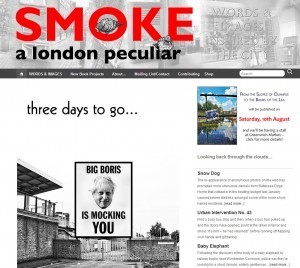
SMOKE: A London Peculiar sales site
How close we are again here to what O’Leary is talking about: “Collective absolution?” —the comfortable bogey-phrases with which colleagues can unwittingly hold each other back. Someone has said “ridiculous sales terms” to someone else. For the record, Rogers encourages us to check her online shop to order the book, and I’m happy to give you that URL for Smoke: A London Peculiar (love the name), an attractive site, indeed. I wish her and her co-author Matt Haynes all the best with it. Over to the States. Back to Table of Contents

From: VQR | About poet Leonard Kress
Barnes and Ignoble
Could the book world one day wax nostalgic for the Amazon era? It’s one of the few things in the book business you can count on.

Boris Kachka
Boris Kachka may be right. His new book has a title almost as long as the Ether: Hothouse: The Art of Survival and the Survival of Art at America’s Most Celebrated Publishing House, Farrar, Straus, and Giroux One of the more eagerly awaited releases of the summer, it’s drawing the predictable great job, but… responses that this sort of book is bound to stir up from major figures long invested in a now-fabled publishing past. 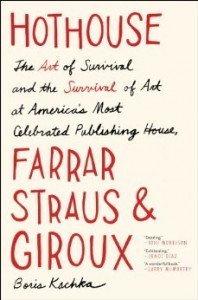 Robert Gottlieb, for example, wades right in with a particularly rich effort at The New Yorker, in Anatomy of a Publisher. His is a good read, the kind of “on the other hand”‘ scrub-up of memories and memes that leaves you on your own to decide whether to read Kachka. So many times does Gottlieb thumbs-down and then thumbs-up the younger man’s book that by the time he’s finished—as with all good criticism—the reader is left having to do his or her own thinking. A bit less so, Kachka’s doing of Barnes and Noble, but no less a worthwhile read.
Robert Gottlieb, for example, wades right in with a particularly rich effort at The New Yorker, in Anatomy of a Publisher. His is a good read, the kind of “on the other hand”‘ scrub-up of memories and memes that leaves you on your own to decide whether to read Kachka. So many times does Gottlieb thumbs-down and then thumbs-up the younger man’s book that by the time he’s finished—as with all good criticism—the reader is left having to do his or her own thinking. A bit less so, Kachka’s doing of Barnes and Noble, but no less a worthwhile read.
Nineteen years ago, Barnes & Noble gave me my first over-the-table paycheck. The ensuing decades saw the rise and decline of a juggernaut—and a close lesson in the ironies of capitalism.
Kachka’s early experience at B&N gives him some credibility for his new observations.
That summer job, in 1994, gave me an oddly quaint sense of a company that already ran more than 200 superstores. I worked in the old flagship Fifth Avenue branch, established in 1932. Across the street from a grungy soggy-bagel diner long since replaced by a Gap, the old store evoked both the chain’s prehistory and that of its CEO Leonard Riggio.
@RebeccaSchinsky Does this person also say “Barnes Ampersand Noble”? — Don Linn (@DonLinn) August 7, 2013
He would end up caught in the contract-renewal disputes between B&N and Simon & Schuster, his Hothouse publisher:
The initial order on my book was bleak—less than 100 books for more than 600 stores—but improved, ironically, after the ABA [American Booksellers Association] touted the title. In the nail-biting interim, I came to appreciate what a sour marriage we’ve all come to have: Barnes & Noble muscled into the market by courting consumer love, wielding cheap books, lattes, and acres of space. Then, one day, we (writers, publishers, and readers) woke up to find we had no other options.
The “collective absolution” of “Amazon is bad” or “Barnes & Noble is bad” isn’t panning out well, is it? After all, as Kachka notes:
That cooing sound you hear from publishers isn’t love for Barnes & Noble; it’s fear of its disappearance. Last year, one executive compared a B&N-free landscape to The Road: “The postapocalyptic world of publishing, with publishers pushing shopping carts down Broadway.”
As much as one might relish the image of those shopping carts jerking along the curb, what’s interesting here is how hard it is for many of our colleagues to live in the gray areas of publishing’s new, shifting realities.
Ok, sure, Jeff Bezos. Sure. — Ginger Clark (@Ginger_Clark) August 6, 2013
Maybe the man who created the disruption-dealing Amazon has many, many, many more dimensions to him than the naysayers thought. (And will the gallery world scream “bloody Seattle!” now that Amazon Art has gone live this week?)
Maybe the great, big, green bookstore chain that finally got Starbucks into the correct proximity to the printed word is perfectly willing to turn around and under-sell its own former employee, Kachka, because it’s trying to wrest more co-op concessions from publishers. Kachka’s New York Magazine write includes a warning: “B&N remains a monster, if a flailing one.”
Be careful who you dub “friend” and “enemy.” They may switch roles tomorrow.
Is it just possible that the fracturing of the industry seen in the entrepreneurial-author movement could be what finally exposes the fallacy of “collective absolution” in publishing?—of simplistic, childish epithets and unwitting “ridculous sales terms” lore?
It’s National Buy a Debut Novel Day today (Not really, but it was National Orgasm Day last week, so why not?).
— Jonny Geller (@JonnyGeller) August 5, 2013
Authors may be in the best position of all to say quietly, over and over to the industry! the industry! that there’s actually no Evil Force at work here at all.
Just a lot of confused, tired people, frustrated by wrenching change, looking for easy scapegoats and the collective absolution of “Seattle made me do it” or “B&N’s bookstores are the last hope we’ve got.”
What do you think? Is there a way for entrepreneurial authors to back down the blame-game beloved of a crisis-addicted business and open up a new way of talking about things? It might start with, “Actually, it’s not ______’s fault. And it’s up to us to figure out how to do better.” What’s your take?
I think Bezos looked at the Grahams and saw his own future. “Citizen Bezos: Amazon’s founder is looking for a legacy” http://t.co/foUTpnBws9
— Tim Carmody (@tcarmody) August 7, 2013
Main image: iStockphoto – KyKyPy3HuK
The post WRITING ON THE ETHER: Pretty Sure They Don’t Wear Black Hats Anymore appeared first on Jane Friedman and was written by Porter Anderson.
WRITING ON THE ETHER: Pretty Sure They Don’t Wear Black Hats Anymore by Porter Anderson
Table of Contents
Waiting to Impale (Ourselves)
Fear and Loathing at the Bookstore
Barnes and Ignoble
Waiting to Impale (Ourselves)
No need for a full aria from me about Jeff Bezos’ brilliant buy of the Washington Post. I’ve given the Writing on the Ether Chorus and Orchestra the day off.

Jeff Bezos
I will just point out to you that here, lo, even in our vale of tears, we’ve had good news. Don’t say we never get it. Washington to Washington.
And even man to man. Did you read Bezos’ letter to the staff? Last lines, in which Bezos is referring to the beleaguered outgoing Post owner Don Graham:
I want to say one last thing that’s really not about the paper or this change in ownership. I have had the great pleasure of getting to know Don very well over the last ten plus years. I do not know a finer man.

Don Graham
Oh, sure, here came the fleas: Jeff Bezos Paid a ‘Friendship Premium’ for The Washington Post (Alexander Abad-Santos, The Atlantic Wire).
And then here came the gnats: Why Jeff Bezos Got a Better Deal on The Washington Post Than You Think (Jordan Weissmann, also The Atlantic Wire).
Not to worry, we’ll be out of here before the locusts arrive.
But we’re going to take the scenic route through Seattle to get to today’s focus on bookstores.

Mathew Ingram
I agree with Mathew Ingram at GigaOm in his roundup, Iceberg buys Titanic: The best insights into Amazon’s Jeff Bezos and his acquisition of the Washington Post: the sweetest headline to come out of the whole thing (and boy, did a lot of headlines come out of the whole thing) is Andrew Leonard’s at Salon: The iceberg just rescued the Titanic.
I liked what Leonard wrote to explain the line, too:
For the journalism business, to call this an earthquake is like, well, it’s like calling Amazon just another bookstore. The Washington Post is one of the premier newspapers in the English-speaking world: the most important publication in the capital of the planet’s greatest superpower. The symbolic importance of the Bezos acquisition is impossible to escape…So now Bezos is giving a little bit back, putting some money down to prop up a cultural institution that has provided great value for many decades, and maybe, just maybe, with a little tinkering, a little more innovation, a little steadfastness and a whole lot more capital investment, could keep shining its light for a few decades more. Let’s see other people follow his example!

Andrew Leonard
Leonard even suggests, “Mark Zuckerberg, why not get Random House back from Bertelsmann?”
Don’t hold your breath on that one. But Leonard’s drift is certainly right. It’s heartening to see an intelligence like Bezos use his remarkable wealth and discernment to reach out and catch such an important, staggered institution as this newspaper.
If anything, as the story broke, I was distressed to get a lot of tweets from folks who wanted to tell me that the news industry is nothing but propaganda and such rags as the Post aren’t worth saving.
The Post is a keenly specialized example of American newspapers in general, and of US journalism in extremis. Some of its work has been landmark material in our nation’s development. The best elements of journalistic inquiry, for that matter, are worth saving. As Leonard puts it: “I’ve bought a lot of books from Amazon. I approve this purchase.”
I bet the Seattle Post-Intelligencer is sitting on the couch with a pint of Ben & Jerry’s, watching The Notebook, crying. #washingtonpost
— David Kazzie (@DavidKazzie) August 5, 2013
And lest you assume that Leonard is lapdogging here, his next-day piece, New reporting guidelines for Jeff Bezos’ Washington Post, pretty much frog-marches our favorite tycoon and his new newspaper empire out on deck and lashes them to their own masthead:
If, as Bezos promised, the responsibility of a newspaper is to its readers, and not to its owners, then he will have to understand that the Washington Post must be above suspicion. Critical coverage of Amazon must intensify. Here are five stories that the Washington Post should put on Page One, ASAP, and keep there, indefinitely.
Each of those five stories is listed with Leonard’s explanation. Quickly, for our purposes:
Amazon vs. Apple
Big Data and privacy
Labor
Net neutrality
Taxes
Waiting for the inevitable piece on how Bezos buying the Post will be bad for publishing and independent bookstores.
— Meredith Hindley (@CapitolClio) August 5, 2013
The kind of “critical coverage” Leonard is talking about is actual journalism. I think Bezos will push his people even harder than the rest of us to achieve it, too. I don’t think Jeff Bezos likes failure. And I think he likes authentic success. That’s why he’s such an inspiration.

Brian O’Leary
And we can thank our friend and colleague Brian O’Leary for reminding us that where once-journalistic media have turned into “propaganda”—usually of the commercial kind—it’s not the “fault” of the Damned Digital Disruption, which we so frequently clothe in Bezos’ jeans. In “Not Our Fault”: We deserve more than a collective absolution, O’Leary writes:
Many newspapers could have survived if the people who ran them saw an over-reliance on advertising as a risk. Instead of pushing lower-value content to satisfy advertisers’ expectations, they might have invested more in serving their communities.
O’Leary isn’t addressing the Bezosian bombshell in his piece; he’s debunking a much wider assertion that newspapers’ “decline was unavoidable.” And he’s right. I have seen precisely that anything-for-an-ad mentality he describes in play at news outlets, first-hand. It was avoidable.
It’s a STING people, not rimshot: http://t.co/6l5HpMIWls (Thanks @cpalmieri) — Craig Mod (@craigmod) August 5, 2013
What I’d like to point out is a parallel between cries of “the Internet killed newspapers!” and “Amazon killed bookstores!” Both are too simplistic. Both are too easy. Both are the scare-mongering excuses of folks whose situations, far more complex than such yelps imply, have left them staggered by mistakes, sometimes of their own making. Both are the “collective absolutions” that O’Leary warns against. About newspapers, he writes with the understanding that many of us can bring to the situation:
It’s not surprising to learn that the people who oversaw the dismantling of the newspaper industry in the United States feel that it’s not their fault. Better yet, they have a bogeyman in companies like Google and Apple, who (by extension) didn’t care about content the way that newspaper people did.
Let’s take a little of that compassion along as we turn to look at bookstore fans who may see Amazon—even Bezos, himself—as their bogeyman. We start in London with a saddening account of change from a self-publishing author. Back to Table of Contents
Post Bezos (Comic) http://t.co/9Es9bdi3dE #tech #technology #joyoftech #geekculture #washingtonpost #general #jeffbezos #voices — preciseTechnology (@preciseTechno) August 7, 2013
Fear and Loathing at the Bookstore
Ten years ago, I walked into a bookshop on the Charing Cross Road, with a rucksack full of Smoke: A London Peculiar, the magazine that I’d made with my friend, Matt Haynes. I went up to the front counter, found a nice man called Mike Atherton, and explained to him what it was: a magazine of words and images inspired by London.

Jude Rogers
This is author Jude Rogers in a write-up, Tough deal, carried by my colleagues at The Bookseller in London. (Just by way of explanation: The Bookseller’s blog carries the views of many folks, not only those of staffers. Rogers is an example. She’s writing as an author and publisher here and is not a member of The Bookseller’s team.) On that day 10 years ago, Rogers tells us, she had good luck.
Mike took 20 of them for Foyles. They sold out in a week. We took along some more. We did similar elsewhere. By issue 3 of Smoke: A London Peculiar, our two-person distribution network was selling 5,000 copies per issue in over 80 London shops, thanks to the relationships we had built with individual booksellers.
 Foyles is the major bookseller, you’ll remember, working to redesign its presence in the marketplace with the development of its new store. I was glad to be invited to its extraordinary research sessions during the winter and wrote about them for my colleagues at Publishing Perspectives. Under Miriam Robinson’s direction and in association with The Bookseller, the store is doing as good a job as any at trying to face a digital future head-on and reel in strong community resources to help recreate itself for success, not failure. What Rogers has to report—not about Foyles, per se, but about the bookselling scene in London—makes Foyles’ efforts at recapturing what’s important all the more urgent:
Foyles is the major bookseller, you’ll remember, working to redesign its presence in the marketplace with the development of its new store. I was glad to be invited to its extraordinary research sessions during the winter and wrote about them for my colleagues at Publishing Perspectives. Under Miriam Robinson’s direction and in association with The Bookseller, the store is doing as good a job as any at trying to face a digital future head-on and reel in strong community resources to help recreate itself for success, not failure. What Rogers has to report—not about Foyles, per se, but about the bookselling scene in London—makes Foyles’ efforts at recapturing what’s important all the more urgent:
Ten years later, Matt and I are launching our first Smoke book, From the Slopes of Olympus to the Banks of the Lea, into a very different marketplace. Now, centralised distribution and buying are king, and the personal approach has little power. In many cases, it’s not even allowed—and this position fails booksellers as well as independent publishers.
Just found this in @thebookseller meeting room. #OldSkool pic.twitter.com/a8vdMUaTYp
— Sam Missingham (@samatlounge) August 8, 2013
Rogers’ account, while anecdotal, is telling. While the bookstore community can cry “Amazon!” all it wants, there are points at which it has, all by itself, made working with content providers all but impossible. Rogers looks back:
We would hand-deliver 340 copies of every issue of Smoke to Malcolm Hopkins, the wonderful magazine buyer at Borders Oxford Street. He shelved them well, and every one would sell—a good return for both parties. But then we received a letter from Borders’ head office saying that, in future, branches would not accept deliveries direct from publishers; we would need to use a “recognised distributor” instead.
Noting the “grim irony” of Borders’ collapse, Rogers writes, “We were forced to pay a distributor to do something that we did perfectly well ourselves for next-to-nothing, given all of our outlets were in London.”
But hang on. There’s another wrinkle to this story. I messaged Rogers on Twitter when I discovered that her forthcoming book isn’t available through US Amazon. The site does have a listing for the book. It says the book is “out of print—limited availability.” When I mentioned this and sent Rogers the link, she tweeted back to me, “I think they’ve just got the details from our ISBN number #cheeky.”

Joanna Penn
Perhaps I was a bit forward here, but I noted to her that being spotted and listed by Amazon might be an advantage, not a disadvantage. I was reminded of reporting here just last month that UK author and writing-community leader Joanna Penn tells me she makes 95 percent of her fiction sales and 70 percent of her non-fiction sales in the US.
Here’s part of my exchange with Rogers after she referred to it as “cheeky” that her book had been picked up on the Amazon site:
@Porter_Anderson I know! But they do also demand ridiculous sales terms, I hear…but do try our shop! — Jude Rogers (@juderogers) August 7, 2013
So even as many authors, especially entrepreneurial authors who are self-publishing, may find themselves all but shut out of bookstore opportunities—and even as they pen astute accounts of the loss of many sales opportunities, as Rogers surely does in her good piece at The Bookseller—they may also turn around and say things to you about “ridiculous sales terms” at Amazon. Sales terms they “hear” about. This is the voodoo of fear-mongering, the kind of gravevine-rattling chatter that can unfairly leave some members of the creative community in the digital dust.

SMOKE: A London Peculiar sales site
How close we are again here to what O’Leary is talking about: “Collective absolution?” —the comfortable bogey-phrases with which colleagues can unwittingly hold each other back. Someone has said “ridiculous sales terms” to someone else. For the record, Rogers encourages us to check her online shop to order the book, and I’m happy to give you that URL for Smoke: A London Peculiar (love the name), an attractive site, indeed. I wish her and her co-author Matt Haynes all the best with it. Over to the States. Back to Table of Contents

From: VQR | About poet Leonard Kress
Barnes and Ignoble
Could the book world one day wax nostalgic for the Amazon era? It’s one of the few things in the book business you can count on.

Boris Kachka
Boris Kachka may be right. His new book has a title almost as long as the Ether: Hothouse: The Art of Survival and the Survival of Art at America’s Most Celebrated Publishing House, Farrar, Straus, and Giroux One of the more eagerly awaited releases of the summer, it’s drawing the predictable great job, but… responses that this sort of book is bound to stir up from major figures long invested in a now-fabled publishing past.  Robert Gottlieb, for example, wades right in with a particularly rich effort at The New Yorker, in Anatomy of a Publisher. His is a good read, the kind of “on the other hand”‘ scrub-up of memories and memes that leaves you on your own to decide whether to read Kachka. So many times does Gottlieb thumbs-down and then thumbs-up the younger man’s book that by the time he’s finished—as with all good criticism—the reader is left having to do his or her own thinking. A bit less so, Kachka’s doing of Barnes and Noble, but no less a worthwhile read.
Robert Gottlieb, for example, wades right in with a particularly rich effort at The New Yorker, in Anatomy of a Publisher. His is a good read, the kind of “on the other hand”‘ scrub-up of memories and memes that leaves you on your own to decide whether to read Kachka. So many times does Gottlieb thumbs-down and then thumbs-up the younger man’s book that by the time he’s finished—as with all good criticism—the reader is left having to do his or her own thinking. A bit less so, Kachka’s doing of Barnes and Noble, but no less a worthwhile read.
Nineteen years ago, Barnes & Noble gave me my first over-the-table paycheck. The ensuing decades saw the rise and decline of a juggernaut—and a close lesson in the ironies of capitalism.
Kachka’s early experience at B&N gives him some credibility for his new observations.
That summer job, in 1994, gave me an oddly quaint sense of a company that already ran more than 200 superstores. I worked in the old flagship Fifth Avenue branch, established in 1932. Across the street from a grungy soggy-bagel diner long since replaced by a Gap, the old store evoked both the chain’s prehistory and that of its CEO Leonard Riggio.
@RebeccaSchinsky Does this person also say “Barnes Ampersand Noble”? — Don Linn (@DonLinn) August 7, 2013
He would end up caught in the contract-renewal disputes between B&N and Simon & Schuster, his Hothouse publisher:
The initial order on my book was bleak—less than 100 books for more than 600 stores—but improved, ironically, after the ABA [American Booksellers Association] touted the title. In the nail-biting interim, I came to appreciate what a sour marriage we’ve all come to have: Barnes & Noble muscled into the market by courting consumer love, wielding cheap books, lattes, and acres of space. Then, one day, we (writers, publishers, and readers) woke up to find we had no other options.
The “collective absolution” of “Amazon is bad” or “Barnes & Noble is bad” isn’t panning out well, is it? After all, as Kachka notes:
That cooing sound you hear from publishers isn’t love for Barnes & Noble; it’s fear of its disappearance. Last year, one executive compared a B&N-free landscape to The Road: “The postapocalyptic world of publishing, with publishers pushing shopping carts down Broadway.”
As much as one might relish the image of those shopping carts jerking along the curb, what’s interesting here is how hard it is for many of our colleagues to live in the gray areas of publishing’s new, shifting realities.
Ok, sure, Jeff Bezos. Sure. — Ginger Clark (@Ginger_Clark) August 6, 2013
Maybe the man who created the disruption-dealing Amazon has many, many, many more dimensions to him than the naysayers thought. (And will the gallery world scream “bloody Seattle!” now that Amazon Art has gone live this week?)
Maybe the great, big, green bookstore chain that finally got Starbucks into the correct proximity to the printed word is perfectly willing to turn around and under-sell its own former employee, Kachka, because it’s trying to wrest more co-op concessions from publishers. Kachka’s New York Magazine write includes a warning: “B&N remains a monster, if a flailing one.”
Be careful who you dub “friend” and “enemy.” They may switch roles tomorrow.
Is it just possible that the fracturing of the industry seen in the entrepreneurial-author movement could be what finally exposes the fallacy of “collective absolution” in publishing?—of simplistic, childish epithets and unwitting “ridculous sales terms” lore?
It’s National Buy a Debut Novel Day today (Not really, but it was National Orgasm Day last week, so why not?).
— Jonny Geller (@JonnyGeller) August 5, 2013
Authors may be in the best position of all to say quietly, over and over to the industry! the industry! that there’s actually no Evil Force at work here at all.
Just a lot of confused, tired people, frustrated by wrenching change, looking for easy scapegoats and the collective absolution of “Seattle made me do it” or “B&N’s bookstores are the last hope we’ve got.”
What do you think? Is there a way for entrepreneurial authors to back down the blame-game beloved of a crisis-addicted business and open up a new way of talking about things? It might start with, “Actually, it’s not ______’s fault. And it’s up to us to figure out how to do better.” What’s your take?
I think Bezos looked at the Grahams and saw his own future. “Citizen Bezos: Amazon’s founder is looking for a legacy” http://t.co/foUTpnBws9
— Tim Carmody (@tcarmody) August 7, 2013
Main image: iStockphoto – KyKyPy3HuK
The post WRITING ON THE ETHER: Pretty Sure They Don’t Wear Black Hats Anymore appeared first on Jane Friedman and was written by Porter Anderson.
August 6, 2013
How to Increase Your Odds at Getting Lucky

Photo by SCFiasco / Flickr
Today’s guest post is by author Ransom Stephens (@ransomstephens).
Last year, an e-mail showed up in my inbox from someone who liked my first novel, The God Patent. Since The God Patent was published three years before, these notes didn’t come as often as they once had.
Instead of ending with something like, “I hope there will be a sequel,” the e-mail ended with “Oh, by the way, I’m an acquisitions editor for 47North, Amazon’s science fiction and fantasy imprint. I was wondering if you might have some time to chat next week.”
Mind you, I never queried this person or this publisher, and I didn’t have an agent.
Okay, let’s back up.
On May 18, 2009, I clicked upload and a manuscript became my first novel, an e-book. Prior to hitting upload, The God Patent had been rejected by more than 50 agents. Comments ranged from “I love this book, but have no idea who would buy it” to (written in all caps) “WHAT MAKES YOU THINK SOMEONE WOULD PAY $15 FOR THIS?”
I promoted the crap out of the e-book, and it did well enough to attract tiny boutique publisher Numina Press, who released a print version. The promotion marathon continued with a YouTube series, blogs, science articles, and 75+ literary events and speeches to writing groups, science groups, and groups of unemployed people (an easy-to-find audience from 2009–2011). A feature article in the San Francisco Chronicle fell into my lap through the confluence of six years volunteering at San Francisco’s literary festival, Litquake, and co-producing a literary series.
By March of 2011, I couldn’t bear another event, but The God Patent continued on its merry way, providing monthly checks that took a nibble out of the mortgage and covered most of my bar tabs.
Even as “the first debut author to emerge from the new paradigm of online publishing” (said the SF Chronicle), my second novel, The Sensory Deception, got rejections from all agents and publishers I queried.
Early in July 2012, ready to go the self-publish route, I contacted three freelance editors for price quotes. Then, on that lovely day in July, in a hotel room in Silicon Valley, preparing to meet with a potential high-tech client to write some physics for engineers and pay a few bills, I got that e-mail from 47North. A month later, I signed a two-book deal.
Today, The Sensory Deception comes out. 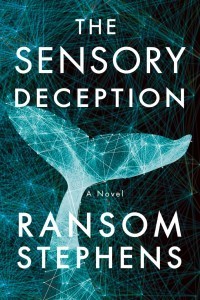
It got the whole treatment: 47North assigned me a development editor and we did a major revision. Then came a copy editor and two proofreaders who repaired my abuse of the English language. The cover is fucking beautiful.
Jane asked me to tell you this story. She wants you to know the useful parts of my experience.
Here are the useful parts:
Expose yourself.
You don’t know everything that is happening.
Do your very best, but don’t obsess too much.
By hitting “upload” four years ago and converting my manuscript into the e-book version of my first novel, The God Patent, I bared my neck to the world. That feeling of exposing myself returned with every promotional activity, including every time I walked into a café, a library, a bar, a museum, or a college to speak, read, or dance. (I don’t actually dance.)
And including every time I hit send to blast my e-mail list (if you’re interested in science, physics for lay people, neuroscience, how science affects society, etc, send me a note and I’ll add you my list). I send notes as rarely as possible, never more than 4-5 times a year, and people seem to actually enjoy receiving them—blows my mind.
Keep pushing and eventually, Sisyphus, you’ll get your rock to the top of hill.
One thing I haven’t told you: As I was querying agents and publishers and collecting rejections, another 47North author, Robert Kroese, read The God Patent and liked it enough to recommend it to his acquisition editor who read it, liked it, and sent me that career-altering e-mail. I was utterly, wholly, ly, unaware that any of this was taking place. Things happen outside of your control and sometimes they’re helpful.
Is it all luck? Sort of, but luck is about odds. The better the odds, the more likely you’ll get lucky. The best way to increase your odds is to increase your opportunity cross section.
Every query you send increases your odds. Every story you publish, every book, every literary event you attend, every time you bear your neck, your cross section gets bigger, and the odds of opportunity finding you increase.
You hear people say that making a living as a novelist is like winning the lottery, but that’s bullshit. Every time you play the lottery the odds are the same.
In this game, every time you play, your odds get better.
But do your best. Don’t put anything out there that sucks. By “sucks” I don’t mean that you have to make sure that I like your work or that Jane Friedman likes your work. Storytelling is a mix of totally subjective art and mostly objective skill. The mostly objective skill boils down to clarity. If people can’t follow your story, no matter how awesome, they won’t like it.
So do your best. Be a craft junkie and learn all the rules and all the tricks, then proceed to break the rules and create your own tricks and write what you think is best, not what I think or Jane thinks, what you think. That’s art.
We hear agents and publishers say “it has to be perfect.” If you’re not a perfectionist, listen to them. If you are a perfectionist, 97% perfect is just fine. Get that thing out the door!
And please, read The Sensory Deception, I hear it’s pretty good.
The post How to Increase Your Odds at Getting Lucky appeared first on Jane Friedman and was written by Ransom Stephens.
Jane Friedman
- Jane Friedman's profile
- 1882 followers


